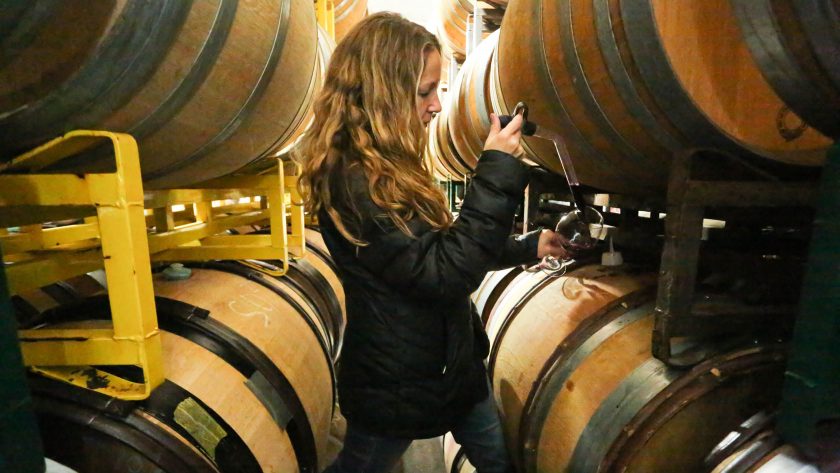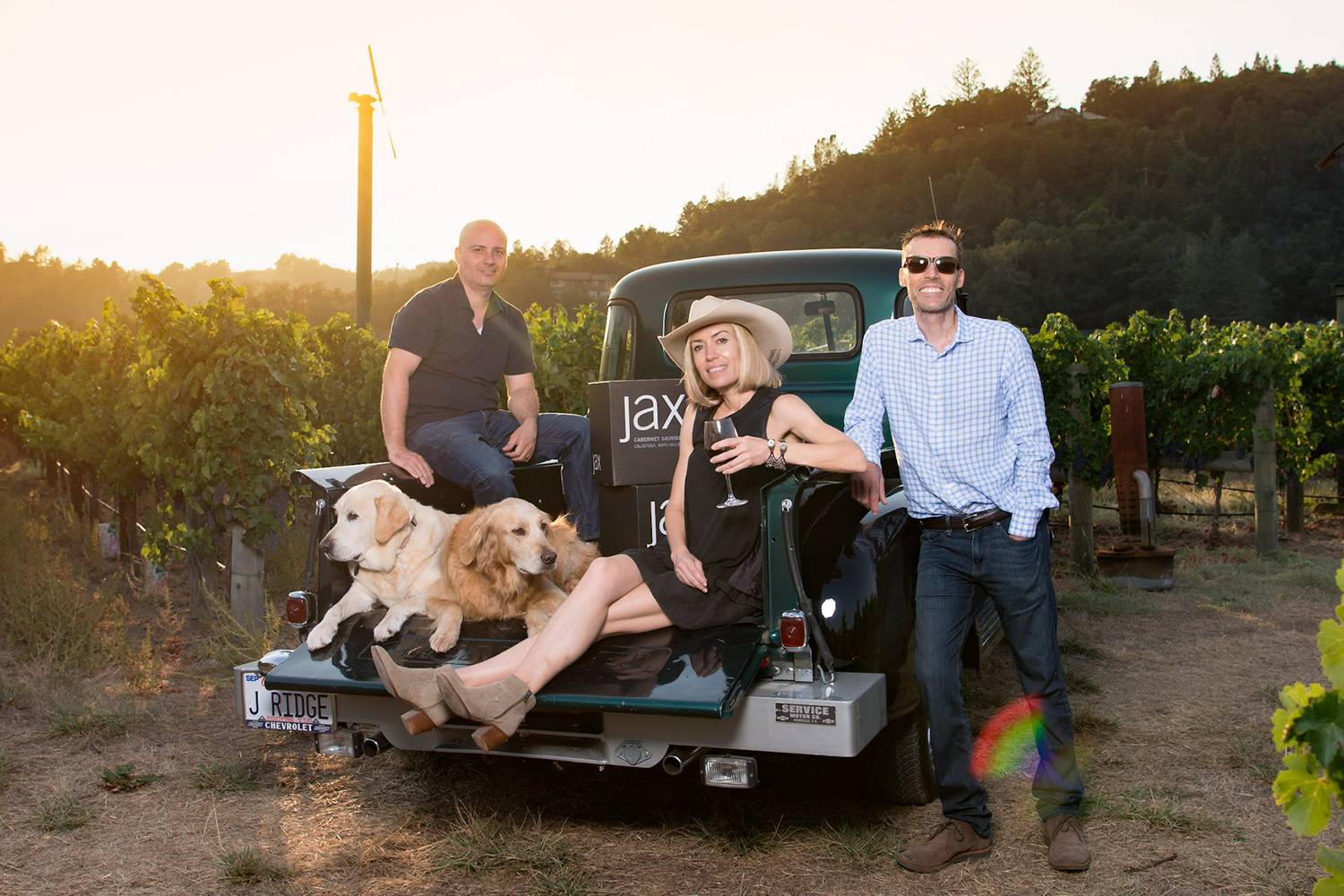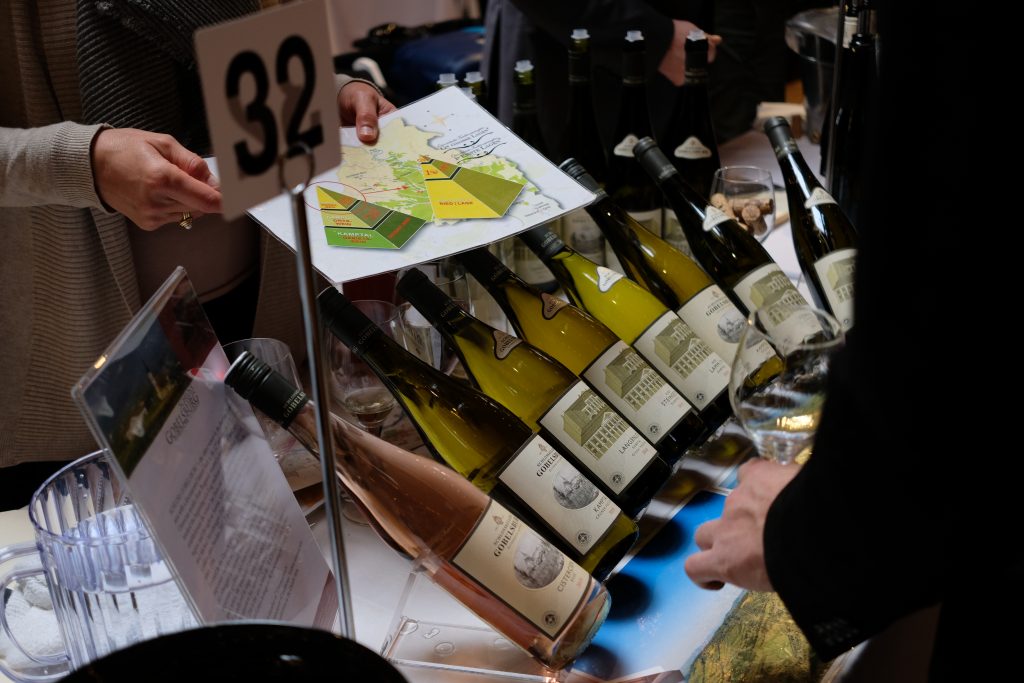Above is Angela Osborne of A Tribute to Grace and Land of Saints.
Next Monday, March 8th is International Women’s Day 2021 – a global day celebrating the social, economic, cultural and political achievements of women! The day also marks a call to action for accelerating gender equality.
In the spirit of IWD, we wanted to highlight some of Skurnik’s many esteemed female producers and proprietors across the world:
Cathy Corison // Corison Winery
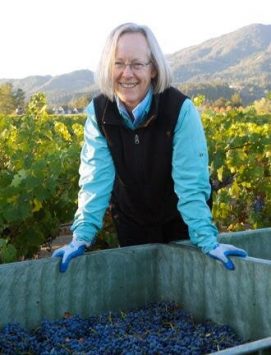
Over three decades, Cathy Corison has become a legend in the benchland in the heart of the Napa Valley. She produces a limited quantity of Napa Valley Cabernet Sauvignon, hand-crafted without compromise from some of the finest vineyards in the Napa Valley. They are all located along the western benchland centered around Rutherford where deep, stony alluvial soils promote the ideal growing conditions for the Cabernet vine. These vines regularly produce some of the most concentrated and superbly ripened fruit anywhere. Many years of winemaking for others, including Chappellet Vineyard, Staglin Family Vineyard, York Creek Vineyards and Long Meadow Ranch, honed her skills and left her eager to express her own winemaking voice.
In 1987, Corison Winery was born. Perhaps more impressive is the consistency of Cathy’s wines. They expressed a vision of Napa Cabernet forged before the region’s modern popularization and stubbornly unchanged in the face of major stylistic shifts that have transformed the wines of Napa Valley in the last 25 years. Corison wines are balanced to grace the table and are recognized throughout the world for their longevity and consistency.
Angela Osborne // A Tribute To Grace & Land of Saints
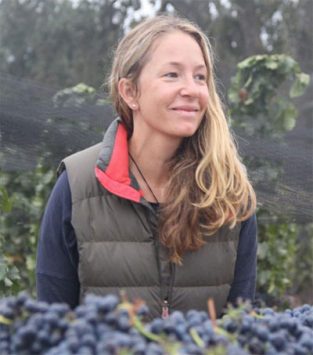
Angela Osborne studied film in her native New Zealand and worked at a wine shop to pay the bills. She was ready to pursue her film career when a winemaker friend found her a harvest job and insisted that she move to California to take it. Once there, she discovered Grenache and fell hard for the grape that would later become the singular focus of her winemaking. Her wines are ethereal and sheer, allowing the land to shine through the nuanced flavors. Angela’s search for graceful Grenache has led her to vineyards from Santa Barbara to the Sierra Foothills.
A Tribute to Grace is made from sustainably-farmed grapes with an eye towards Biodynamics. Angela’s mindfulness continues to her delicate handling of wine, which includes the use of neutral oak and only small sulfur additions at bottling for stability. Inspired to accessibly share California’s array of wines with her export partners – Angela was challenged to find fruit sources that spoke to variety and place—all without wavering in her commitment to value. To do so she turned to winemaker Manuel Cuevas, owner of C2 Cellars, the custom-crush facility in which Angela makes A Tribute to Grace, and Land of Saints was born.
Jasmine Hirsch // Hirsch Vineyards
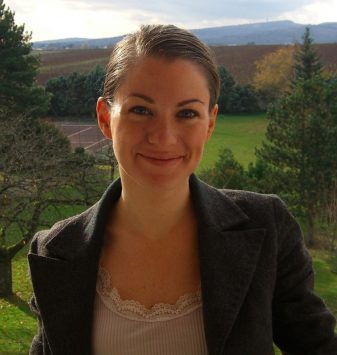
Perched on a ridge overlooking the Pacific Ocean at Fort Ross, Hirsch Vineyards is the birth ground of great Pinot Noir on the extreme Sonoma Coast. A pioneer of his time, Jasmine’s father David Hirsch first planted vines on this old sheep grazing land, just two miles from the ocean (now Fort Ross AVA) in Sonoma County, back in 1980. He became well known among a small group of top Pinot producers – i.e. Williams Selyem, Kistler, Littorai, and others – to whom he sold fruit.
The on-site winery was built in 2002 and the wines have been made by several talented winemakers, such as Vanessa Wong, Ross Cobb , Anthony Filiberti, and now Jasmine Hirsch who became the official winemaker in 2019.
Vanessa Wong // Peay Vineyards & Cep
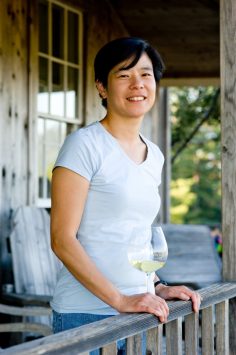
Peay Vineyards sits on a ridge top above a river gorge in the northwestern corner of the “true” Sonoma Coast 4 miles from the chilly Pacific Ocean. A consistent afternoon ocean wind, placement in the cool inversion layer and ancient marine soils allow them to produce wines of elegance, intensity and focus. Husband and wife, Nick Peay & Vanessa Wong, grow and make the wine and brother, Andy Peay, sells the wine and runs the business.
Vanessa Wong visited Peay in the fall of 2000 and fell in love with the beauty of the place as well as the quality of the young vine fruit she tasted while walking the vineyard with Nick Peay. Vanessa joined Peay Vineyards in the spring before their first vintage in 2001, and married Nick the following year. Prior to coming to Peay, Vanessa worked at Peter Michael Winery as winemaker and assistant winemaker from 1996-2000. She also spent time working in France at Château Lafite-Rothschild in Pauillac and Domaine Jean Gros in Vosne-Romanée. Cep Pinot Noir, Syrah, Sauvignon Blanc, and Chardonnay are made from barrels of wine that do not make it into one of the Peay wines.
Megan Hughes // Barnard Griffin
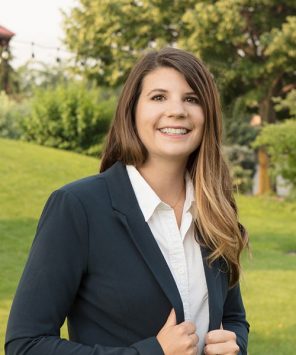
Barnard Griffin is one of the oldest family-owned wineries in Washington state. Rob has been recognized as the longest practicing winemaker in the state of Washington and recently celebrated his 41st vintage. His wife Deborah helps to run winery operations, and they’ve welcomed their daughter, Megan Hughes, into the fold as Assistant Winemaker and Enologist.
Megan joined her parents in the family business after graduating in 2010 with a Bachelor of Science degree in Viticulture and Enology from Washington State University. Megan’s passion for Washington wine began at an early age while assisting her parents at the winery, being paid solely in M&Ms. The wines from Barnard Griffin are an amazing value made by a dedicated family of winemakers.
Andrea Mullineux // Mullineux & Fog Monster

Mullineux was established in 2007 in the Swartland region of South Africa, owned and managed by Andrea Mullineux and her husband Chris. Within a very short time period the winery established itself as one of South Africa’s most celebrated wine brands, both locally and on the international front. The Swartland has a very unique geology which allows for exploration of its various terroirs through Western Cape classic varieties like Chenin Blanc and Syrah, among others. The Mullineuxs are humbled by how winemaking enables them to interact with the ancient history of the mother rock.
Growing up in Northern California, Winemaker Andrea Mullineux studied Viticulture and Oenology at UC-Davis before working in Stellenbosch and meeting Chris at a wine festival in Champagne. Chris is the Viticulturist, in charge of the vineyards on their farm on Kasteelberg Mountain as well as fruit sourcing for their value Kloof Street wines. In addition to Mullineux, Andrea produces wines for her passion project, Fog Monster in her home state of California.
Claire Allan // Huia Vineyards
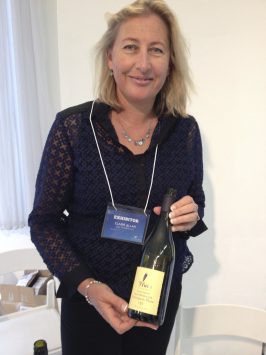
Founded by husband-and-wife duo Mike and Claire Allan in 1996, Huia Vineyards(pronounced “HOO-yah”) is one of Marlborough’s only producers dedicated to the production of minimal intervention, organically farmed wines. The winery remains family-owned and operated today. After studying winemaking in Australia at the University of Adelaide’s Roseworthy College, Claire spent time at Champagne Taittinger before returning home to New Zealand where she served as the first winemaker at Lawson’s Dry Hills. Mike met Claire at Roseworthy College before going onto have his own winemaking career at seminal New Zealand wineries such as Cloudy Bay, while also briefly working in Champagne at Veuve Cliquot.
When Mike and Claire decided to establish their own brand, the couple knew they would remain in Marlborough for the same reason that first attracted them to the region. Namely, the bright, aromatic fruit character that defined the wines produced there. Given Mike’s passion for fishing, its coastal location didn’t hurt either. Named after the fishing boat that Mike built for himself, the Hunky Dory label from Huia Vineyards offers exceptional values which still carry the same organic certification as their estate range.
Eve Cartier // Mas de Gourgonnier
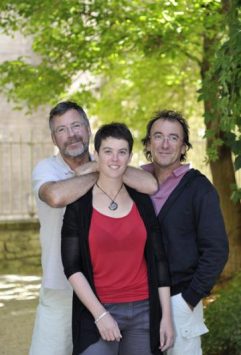
Mas de Gourgonnier is a storied domaine, run with passion and skill by Eve Cartier, that has been farming and making wine organically for decades – long before it came to be in fashion. Their gorgeous property in the beautiful countryside appellation of Les Baux de Provence in the South of France yields powerful expressions of Grenache, Syrah, Mourvedre, Carignan, and more – not to mention olives (their oil is one of France’s finest), and incredible fruit and vegetables.
Eve’s wines combine the richness and intensity of top Rhone or Bordeaux with a crystal-clear and unmistakable expression of Provençal soil.
Hélène Mardon // Domaine Mardon
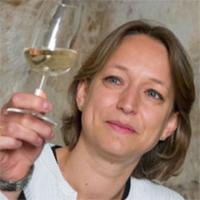
The village of Quincy is located about 50 miles west of Sancerre on the left bank of the Cher river. To those in the know, this picture-esque Loire Valley appellation is an excellent source of crisp, mineral-driven Sauvignon Blanc that, in the right hands, can match the quality found from their more famous neighbor. Domaine Mardon has been producing wine in the area since the early 19th century and it is indisputable that they produce the best, most serious, most complex Quincy available.
Today Hélène Mardon runs this small, family-owned domaine with the cellar below the house and a total annual production of under 10,000 cases. Their “Tres Vieilles Vignes” cuvée is made from vines that exceed 50 years of age, and it rivals many top Sancerre for its complexity and depth.
Charlène Pinson // Domaine Pinson
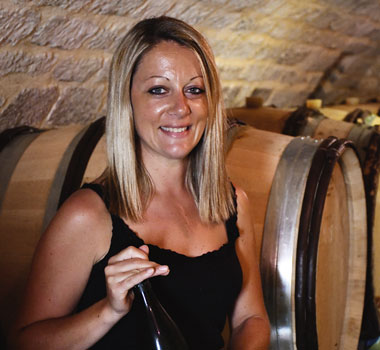
Domaine Pinson stands out is one of the oldest families in all of Chablis, having farmed in the village since at least 1640. Perhaps the family’s most important historical figure, Louis Pinson, led the domaine in 1940 to become one of the first properties in Chablis to estate bottle and sell directly to the public. The domaine today is run by the dynamic Charlène Pinson alongside her father Laurent. They own 14 hectares of the crème de la crème of Chablis terroir, with prime holdings in six premier crus and the grandest cru of them all, Les Clos.
There is a stunning display of intense purity across the Domaine Pinson range, seamlessly marrying the historical grandeur found in Kimmeridgian marl and the noble Chardonnay of Burgundy.
Sara Pérez // Venus La Universal & Sara y René Viticultors
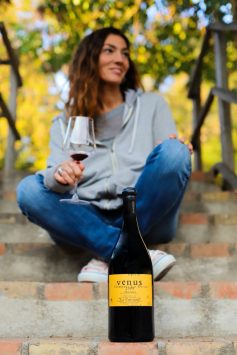
Sara Pérez Ovejero and her husband René Barbier Meyer are children of famed members of the ‘Gratallops Five’—the (then) ragtag band that shot the Priorat into new prominence in the late 1980s and early 1990s with their ‘Clos’-marketed labels and communal aesthetic—and to this day Sara has the reins of her family’s Mas Martinet while René oversees Clos Mogador. And it was in fact on a sales trip in the United States for their respective family wineries that their romance began. Back in Spain, they eventually settled in the town of Falset, where their Montsant-appellation passion project was born in the early 2000s: Venus La Universal. A personal Priorat adventure followed close behind when they were able to acquire the Bellvisos vineyard, a super-steep, old-vine coster in the village of Gratallops. A couple other parcels followed, and the Sara y René Viticultors project was also born.
Despite distinct origins, certain constants adhere across appellations—farming is certified organic by the CCPAE, and a feathery cellar touch involves both minimal sulfur (zero, in some vintages of certain cuvées, as appropriate with natural acidity and p.H. levels) and a creative use of fermentation and aging vessels, which range from concrete to amphora to a bewildering array of used wood formats. All in all, these are naturally-made wines dripping with the personality of both the uncompromising Mediterranean landscape and the loving couple that birthed them.
Monica Raspi // Pomona
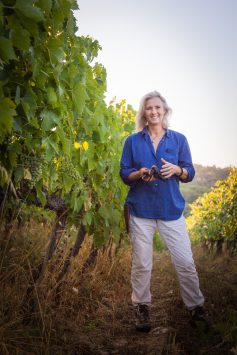
The call of the countryside was just too strong for Monica Raspi to resist. In 2007 when her mother was thinking about retiring and selling her great grandfather’s 150 year old estate in Chianti Classico, Monica promptly sold her veterinary clinic and set out to revitalize the family farm. Monica’s first harvest was 2007, and she immediately found that the work absorbed her entirely. She thrives on being in touch with nature and family on a daily basis. She started with a single hectare, which has now expanded to five.
In 2009, she began her conversion to organic viticulture, and was certified in 2012. Lisini’s winemaker Filippo Paoletti, who studied under the great Sangiovesistas Franco Bernabei and Giulio Gambelli, is Pomona’s consulting winemaker since 2002. A better recipe for success has rarely been seen: the combination of Monica’s passion for classically styled wines in a high quality, ancient terroir, and the shoulders of these giants to stand on make Pomona a must-taste winery.
Claudia Cigliuti // Cigliuti
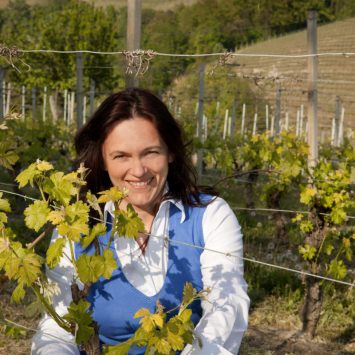
Claudia’s father, Renato Cigliuti comes from four generations of farmers who have tilled the Langhe soils to support their families. So, it came as a great shock to Renato’s family and their neighbors in the early 1960s when Renato decided to begin green harvesting, a practice utilized by very few producers at the time. His neighbors wanted to have him committed for “throwing away money,” but Renato had a clear idea of what he wanted to accomplish, having always believed that the local Langhe soil was capable of producing high quality, long-lasting wines.
Over the years Renato did not expand his winery a great deal, mostly because he didn’t think his daughters would be interested in working the land. But life, as it often does, surprised him. Today the winery is run by Claudia and Silvia Cigliuti, with Renato and his wife Dina supervising. Both of his daughters began working on the farm in their spare time as students and fell in love with the countryside – just like their father. For the Cigliuti family, 90% of the winemaking process happens in the vineyard. Only in this way can the final product capture the characteristics of a vintage and the identity of a terroir.
Clelia Romano // Colli di Lapio
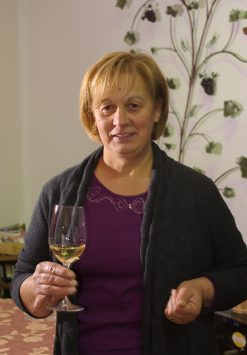
There is no denying that the windblown slopes of Campania’s mountains host some of the most spectacular vineyards in all of Italy. It is here, in the Lapio village of Arianiello, that you’ll find the estate of Clelia Romano’s Colli di Lapio. Dedicated to the cultivation of varieties that date back to the ancient Greeks, the vineyards of Colli di Lapio are considered part of the grand cru area for Fiano. Known as one of Italy’s truly great white wines, the best expressions of Fiano show aromatic fruits and vibrant acidity in their youth, which, when given time, evolve into mineral wines that echo qualities of grand cru Chablis.
Not to be outdone in ageability, Clelia Romano also offers two expressions of Aglianico, which speaks of earth and sunshine, and acts as the King to Fiano’s Queen. The end result are wines that gives immense and unfolding pleasure at every turn, which is what you’ll find with each and every bottle of Clelia Romano’s Colli di Lapio.
Heidi Schrock // Heidi Schrock

Heidi Schröck took over her family winery in 1983, in the historic village of Rust situated in the province of Burgenland about 5 miles from the Hungarian border. She re-introduced historic varietals such as muscat-lunel and furmint from Hungary while continuing to work with more classic Austrian varietals such as Grauburgunder, Weissburgunder, and Welschriesling.
In 2003 Heidi was awarded “Falstaff Vintner of the Year”, making her one of only a handful of women to obtain this distinction. Heidi is now joined by her twin sons, Johannes and Georg, who, like their mother, continue to produce classic Ruster wines, while experimenting with other varieties and winemaking styles on the side.
Theresa Breuer // Weingut Georg Breuer
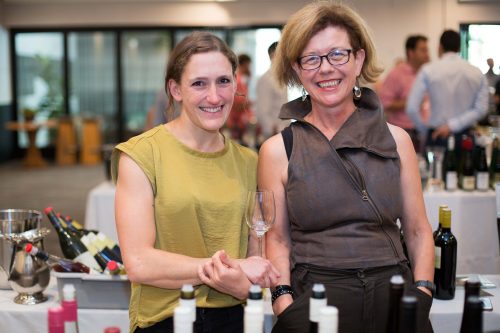
Weingut Georg Breuer looks back on 130 years of history, beginning in 1880 when it was founded by the Hillebrand and Scholl families. Peter Breuer purchased the property in the early 20th century, passing it to his son Georg (1910-1982) several years later.
Today, his daughter Theresa Breuer runs the estate with her uncle Heinrich as well as longtime manager and icon in the region, Hermann Schmoranz, and cellar master Markus Lunden. The estate now spans over 30 hectares, with a majority of the holdings located in the three greatest Grand Crus in Rüdesheim – Berg Schlossberg, Berg Roseneck and Berg Rottland, and the Monopole site, Nonnenberg in Rauenthal. These two distinct villages are a pair of the very finest in the Rheingau, bookending the region from east to west. The vineyards are farmed using organic methods and are certified by Fair N Green. In the top sites, yields are reduced to between 15-25 hectoliters per hectare with 45hl/ha for the Estate and Village level wines.
Mathilde Margaine // Champagne A. Margaine
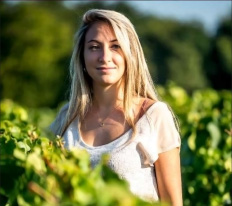
Arnaud Margaine’s daughter Mathilde joined her father at the estate in 2018, marking the 5th generation to work this land. Margaine stands out in our portfolio and in all of Champagne. The majority of Margaine’s holdings are in the 1er Cru village of Villers-Marmery, a village planted 95% to Chardonnay, while the neighboring villages are dominated by Pinot Noir. Their focus on Chardonnay in the Montagne de Reims is certainly something of an anomaly, particularly in a region best known for Pinot Noirs. The chalky, limestone based soils and east-facing exposition in Villers-Marmery are more similar to those of the Côte de Blancs than their closest neighbors in Verzy or Trepail.
Mathilde’s increasing influence in the estate can be seen in all aspects, from branding and label design to farming techniques and practices. Her slight modifications to the style of the wines can be felt too, moving away from the more reductive style of the wines previously.
Nanami Watanabe // Niizawa Brewery
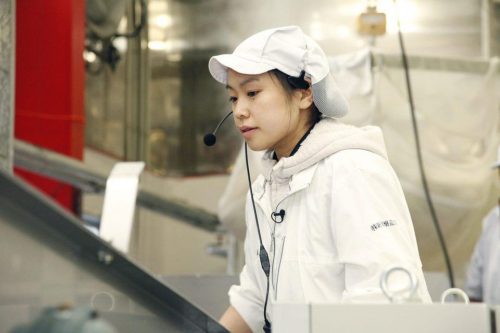
After 17 years as toji at Niizawa Brewery, in January 2018 Iwao Niizawa stepped away from that role and is now fully concentrating on business development as president and owner. To lead the team and raise the level of the sake, he has selected 22-year-old Nanami Watanabe from his staff to take over his duties as the toji, making her the youngest sake brewmaster in the world.
Despite her young age she completed the prestigious brewing studies program at Tokyo Agricultural University at 19 and during her three years at Niizawa has set herself apart with both a deep understanding and nuanced feel for the art of fermentation, a natural leadership and work ethic that won over senior members of the team and a palate that surprised Niizawa-san with both its sensitivity and her ability to analyze sake.
Allison Evanow // Square One Organic Spirits
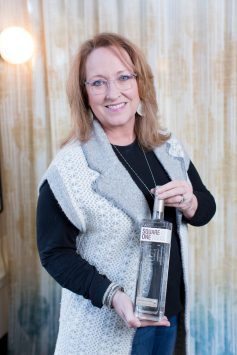
In 2004, spirits lover Allison Evanow found that there were no producers making exclusively organic spirits and sought to remedy that. She began producing Square One vodkas from Idaho with a 100% USDA-Organic Certification by Oregon-Tith as well as the U.S. Department of Agriculture’s National Organic Program.
Evanow puts great care into every detail of production. Her vodkas are made with water from the Teton Mountains and distilled exclusively from Montana-grown rye lending a nutty complexity. Additionally, Square One’s distillery is the largest consumer of Rocky Mountain Wind Power which generates 25% of the producer’s power. She even includes the use of soy-based inks to create carbon neutral bottle labels, chlorine-free shipper cartons, and recycled materials whenever possible. Also of note are the stylish bottles Square One uses that look good enough to be up-cycled in a variety of ways, with labels created to easily soak off.




